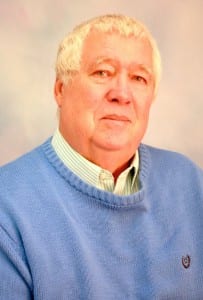Associate Professor Earl Nicodemus was honored recently when he was named an official West Virginia History Hero by the West Virginia Division of Culture and History. He joined the group of 50 statewide History Heroes at a ceremony held at the West Virginia State Capitol Complex, Charleston, W.Va. where he was presented with an award.
“This honor is the result of several others nominating me and I’m grateful. It seems more of an honor for the West Liberty Historical Society as a group really — but it was nice that they nominated me,” said Nicodemus who refers to himself as an historical storyteller. West Virginia History Heroes are chosen for their dedicated service on behalf of an organization’s programs or for significant contributions to state and local history.
Nicodemus, whose field is instructional technology in the College of Education, is completing his 40th year as an educator at West Liberty University and is the institution’s longest-tenured professor. He also has served as a former chair of the Department of Professional Education and will be retiring at the end of this academic year.
A charter member and founding president of the Historical Society, Nicodemus currently serves as vice president and treasurer. He has been a trustee of the old West Liberty Cemetery since 1985 and is responsible for cemetery maintenance and upkeep.
He has mapped the grave sites and done extensive research on those buried there, including veterans of the American Revolution and Civil War. Nicodemus recently documented the Old West Liberty Court House. The author of numerous articles on the history of West Liberty and the cemetery, he also gives presentations on the town’s history to civic and social organizations.
Nicodeums’ interest in history began in the fall of 1984 during a family visit to the old West Liberty Cemetery not far from where he lives.
Except for a well worn path through the middle, the cemetery was overgrown with weeds, some of which were 10 feet high, according to Nicodemus.
“We were amazed by the fact that there were men from the American Revolution and the Civil War buried there, so the next spring, my wife and I and our two small children cleaned it up. Then, we mapped and recorded everything. The last living trustee learned what we were doing and appointed me to be a trustee,” he said.
“From 1985 until 2014, our family maintained the cemetery. I wanted to know who those soldiers were, so I began to research them. Other people learned that I was interested and began to send me information, so my interest in local history grew slowly over time,” he said.
“This area was very important to the creation of our country,” Nicodemus said. “Some of the men who fought for our independence are buried right here in West Liberty. There are places in three states named after Capt. Samuel Brady who led Brady’s Rangers and who commanded Gen. “Mad” Anthony Wayne’s scouts, enabling the victory over the Indians at Fallen Timbers. Gen. Benjamin Biggs fought with Sam Brady and briefly commanded Fort Henry in Wheeling. General Biggs also helped to organize the troops from this part of Virginia during the War of 1812,” he added.
“Curtis Hall at West Virginia University is named after Gen. William Baker Curtis who organized and led the 12th W.Va. infantry during the Civil War. Curtis’s men were instrumental in the battle for Fort Gregg and the fall of Petersburg. Gen. Curtis’s grandfather was wounded during the revolutionary war, and the general’s son was awarded the Medal of Honor for his actions at Fort Gregg. Gen. Curtis’s brother died fighting for the Confederacy. Someone has to preserve the resting place of these heroes of our past. If we don’t do it, that heritage will be gone,” Nicodemus said.
Asked for a few of the most interesting history tidbits about West Liberty, Nicodemus noted, “West Liberty was established on this ridge because of the great spring located here. West Liberty was the original county seat of Ohio County, which included most of what is now the Northern Panhandle of West Virginia,” he noted.
“The first court west of Pittsburgh was held in West Liberty in 1777, and the old courthouse is still standing. Court was held in West Liberty from 1777 until 1797 when the county seat was moved to Wheeling. Because of the court, the spring is still known today as ‘Court Springs.’ The first U.S. post office west of Pittsburgh was located in West Liberty,” he continued.
“On court days, as many as 2,000 to 3,000 people would come to West Liberty for games and horse races, etc. According to the Sons of the American Revolution, there are more veterans buried in the old one-acre West Liberty Cemetery than in any other acre of ground in the United States outside of the national cemeteries,” Nicodemus said.
West Virginia History Day at the Legislature was begun by the West Virginia Archives and History Commission in 1997 and is officially designated by the commission as a special day to recognize the state’s rich and varied history. The History Heroes ceremony was part of the festivities. Co-sponsors include: the Archives and History Commission, the Friends of Culture and History, Mining Your History Foundation, Preservation Alliance of West Virginia Inc., West Virginia Association of Museums, West Virginia Division of Culture and History, West Virginia Historical Society and West Virginia Humanities Council.
Nicodemus encourages everyone to view the West Liberty Stories and Resources page he’s created and maintained here.
NOTE: An article written by Janice R. Kiaski in the Weirton Daily Times was used in preparing this WLU press release.
The post Professor Earl Nicodemus Named WV History Hero appeared first on News & Media Relations.